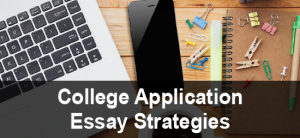UPDATE: The Common Application released a revised version of the prompt on failure for the 2017-2018 admissions cycle.
The revised topic is: “The lessons we take from obstacles we encounter can be fundamental to later success. Recount a time when you faced a challenge, setback, or failure. How did it affect you, and what did you learn from the experience?”
The older failure prompt was: “Recount an incident or time when you experienced failure. How did it affect you, and what lessons did you learn?”
IMPORTANT THINGS TO NOTE ABOUT THE
NEW WORDING OF THE ESSAY PROMPT
1. The primary stress is no longer just on failure. You’re also invited to write about obstacles, challenges, and setbacks. Many students used to fall into the trap of writing about the same banal, limited, and traditional range of failures.
2. The main emphasis is no longer just on the “time when you faced a challenge, setback or failure.” Notice how that experience is framed with language about “the lessons” we learn, the connection to “later success,” and how it influenced you in other ways. Don’t worry if you can’t connect your experience to “later success.” Remember that you have creative license with your essay. You are encouraged to use the essay “prompt to inspire and structure your response.” CLICK HERE to learn more about the directions for your Common App essay.
WHY ARE COLLEGES INTERESTED IN YOUR EXPERIENCE WITH OBSTACLES, CHALLENGES, SETBACKS, AND FAILURES?
Over the years, I’ve worked with a number of students who’ve had life-changing experiences with obstacles, challenges, setbacks, and failures, but they’ve often felt very nervous about writing about them.
I understand this fear.
Given the highly competitive nature of undergraduate college admissions, it’s natural to feel you should showcase your strengths and hide any weaknesses or mistakes.
However, colleges are very interested in students who know how to handle failure and who’ve experienced setbacks that have changed the way they think and act. In fact, the teachers writing your letters of recommendation are actually asked to rank you in terms of your ability to respond to setbacks.
Listen to what the MIT admissions team has to say in “The Match Between You and MIT”:
“MIT wants to admit people who are not only planning to succeed, but who are not afraid to fail. When people take risks in life, they learn resilience as a result–because risk leads to failure as often as it leads to success. The most creative and successful people–and MIT is loaded with them–know that failure is part of life and that if you stay focused and don’t give, goals are ultimately realized.”
In college, you’re going to face new and more complex situations that are designed to stimulate your intellectual and personal growth. If you’re not capable of handling setbacks–minor or major–you’re going to have a very hard time succeeding in college. You need to be resilient. You need to have strategies for bouncing back from things that don’t go exactly as planned. You need to know how to fine-tune your course of action. . .your ways of thinking.
As a former English professor who has worked with thousands of college freshmen, I can tell you that one of the reasons why some students struggle during their first year is because they haven’t learned these underlying life skills. It’s not just that college is harder or that there’s more work. It’s that you need these underlying skills to navigate your experience.
As the quote from the MIT team reveals, success often involves taking risks. But don’t just take it from MIT.
Consider what JK Rowling declared in her 2008 Harvard Commencement Address, which she titled: “The Fringe Benefits of Failure, and The Importance of Imagination”:
“It is impossible to live without failing at something, unless you live so cautiously that you might as well not have lived at all–in which case, you fail by default.”
So application essays that shed light on your experience grappling with an obstacle, challenge, setback, or failure can be a way of demonstrating that you possess these essential character traits and skills. What was once a weakness can now be a strength!
CASE STUDY OF A CREATIVE ANGLE ON THE OBSTACLE/CHALLENGE/SETBACK/FAILURE ESSAY
I want to share with you a case study of a former student who earned a full-tuition scholarship to a Top 50 school.
In her college application essay, this student focused on failing to live up to her parents’ expectations. This student excelled in school and on standardized tests, but there was a part of her that always felt like a failure because she couldn’t live up to her parents’ desire for her to be more outgoing. She felt pressure to change, and she tried to change, but she could never really become more extroverted.
In her essay, she described this challenge and how Susan Cain’s TED talk and book (Quiet: The Power of Introverts in a World That Can’t Stop Talking) helped her realize that as an introvert she actually had many positive qualities. She detailed this inner transformation and how she gradually stopped trying to live up to her family’s expectations. Towards the end of her essay, she shared anecdotes that revealed how she’d started embracing her good qualities and became more confident, which, in turn, enabled her to make more positive contributions in school and in other aspects of her life.
I loved the twists in her essay. In the beginning, it seemed like her essay was about failing to live up to her parents’ expectations, but she revealed that the real failure was in not being true to who she is. This particular twist added depth to her essay.
What kind of interesting angle can you develop in relation to this Common App essay topic?
How can you use anecdotes to shed light on your character and underlying skills?
WATCH THIS VIDEO TO LEARN MORE ABOUT WHAT YOU SHOULD & SHOULD NOT DO WHEN WRITING ABOUT AN OBSTACLE, CHALLENGE, SETBACK, OR FAILURE
I created this video before the Common App revised the language of the essay prompt, but my advice should still prove useful because I provide you with some strategies for structuring your essay.
This is a video that features many of the ideas I discussed in this blog post.
NEED MORE HELP?
CLICK HERE to learn about my one-hour consultations.
Blog post image: ©thepoeticimage/bigstock.com



